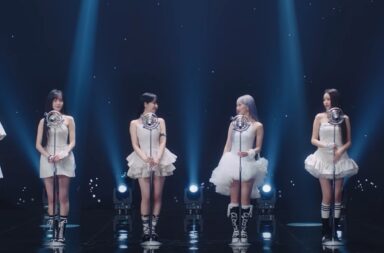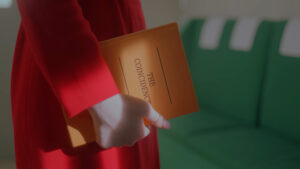
For a spring release, Heize’s “Happen” MV seems to fit the season’s hopeful tone—and its associations with new beginnings—to a tee. The set is brightly coloured, almost toy-like, and the narrative is set up as a classic meet cute story. But as the same set of scenes repeat, the MV reveals itself to be more than a simple meet cute; it’s also a meditation on the different possibilities of human encounters and connections—the meetings and non-meetings that fate can bring.
The complexity of “Happen” is created mainly by its structure: each repetition of the same sequence of events casts the prior iteration in a different light, pushing the viewer to reconsider their interpretation of the narrative. The MV begins with a pensive narration of two lines:
I don’t know if chance encounters are truly by chance.
I’m meeting you for the first time, but I don’t know if it’s truly our first.
Seen in isolation from the song’s lyrics and the MV’s content, the tone of these lines is both mystical and optimistic, hinting at the hand of fate in orchestrating human encounters. This narration is followed by a quick preview of the scenes that will come to pass. Each cut is a near-encounter between Heize and a man who lives one floor below her. By showing the vignettes in quick succession, the MV supports the narration: these coincidences are so numerous that they call into question whether they have occurred purely by chance, or whether a larger cosmic force is at work.
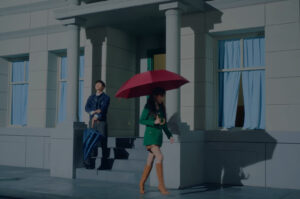
The expectation that the plot will illustrate a fated connection is furthered when the scenes unfold in detail. As Heize steps out of her building, the act of opening her umbrella obscures her view of Song Joong-ki returning home, and her umbrella similarly blocks his view of her when he glances at her leaving. On another occasion, Joong-ki waits for the lift, but turns back to fetch his phone, narrowly missing Heize in the lift. They visit the same cafe, but Heize eats in while Joong-ki has his coffee to-go; she sneaks a peek at him, and he looks at her as well, but once again, they are a beat away from actually locking gazes. He picks up her coffee by accident, but realises only when he’s back in his car—it’s too late to return it to her.
As Heize and Joong-ki keep brushing past each other, these recurring coincidences seem to pique the curiosity of both characters. Hints that they are becoming conscious of each other’s presence leads viewers to anticipate the moment where they finally meet, interact, and possibly fall in love.
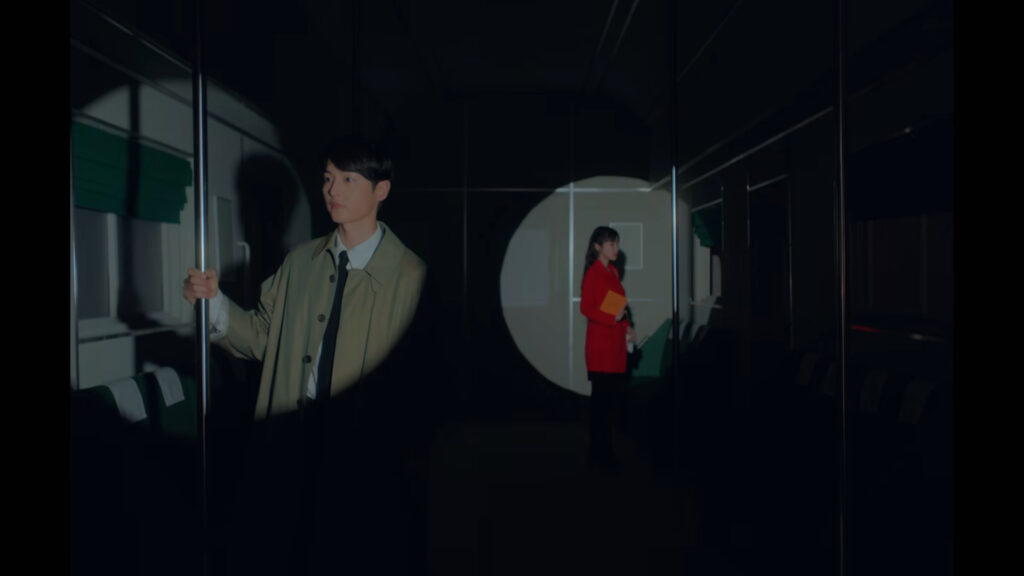
But the MV soon throws a curveball at the viewer. A crowded train carriage that Heize and Joong-ki ride in is replaced by an empty one. While previous scenes, with their realistic tone, seemed to capture snippets of their daily life, the spotlights trained on them in this shot immediately shift the mood to a surreal one. The association of spotlights with the stage raises the question of whether what we see is really a slice-of-life portrayal or a kind of fiction or figment of someone’s imagination.
Doubts about the realism of these scenes are further confirmed when the camera pulls back to show Heize, in a gallery-like setting, observing the image of herself on the train. But the anticipation for the fateful moment–where their parallel lives finally converge–continues building, for Joong-ki, who is studying another photograph of them nearby, finally returns her curious gaze.
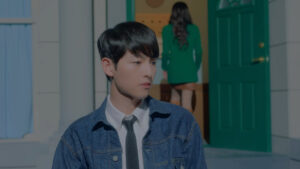
A close-up of Joong-ki walking towards Heize in the gallery is intercut with shots of earlier events. This time, the events are shown from his perspective, and the viewer sees that he, too, has been noticing Heize all this while. But key details are altered: he gets to the lift in time and politely nods at her; they drink coffee and share a cheerful conversation in his home office, and he puts a vibrant orange verbena in the coffee cup bearing her name. These are possibilities that could unfold with just a simple interaction at the gallery.
Except Joong-ki does not initiate conversation with Heize, as she (and by extension the viewer) had been expecting. He walks right past her, and his brief glance is directed not at her, but at the photo she stands in front of. This outcome is quiet but crushing, forcing Heize and the viewer to come to grips with a reality that differs from their expectations.
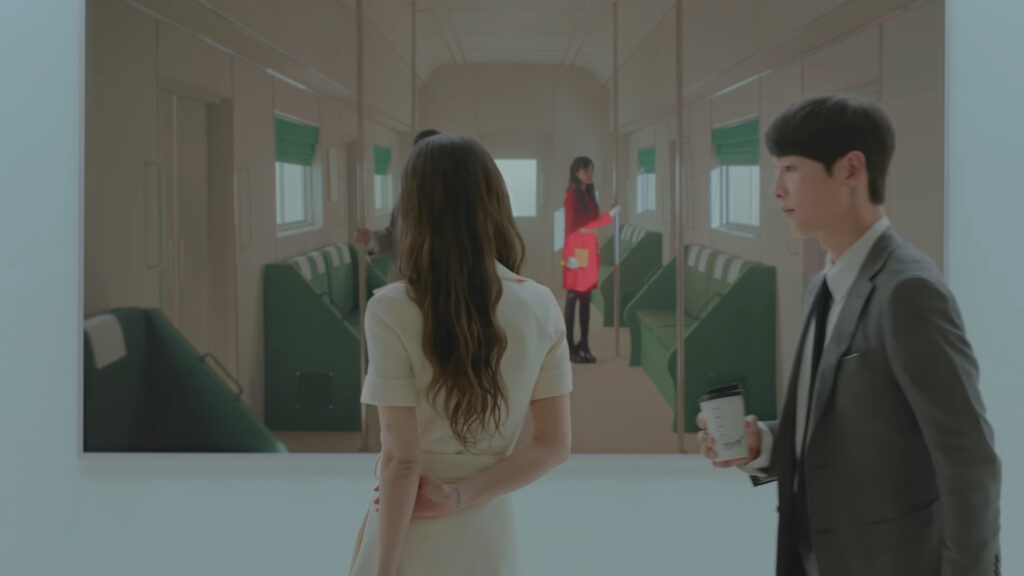
It might be tempting to thus interpret the MV as a portrayal of Heize’s rose-tinted fantasies about chance encounters leading to love. After all, the bright colours—a signature of many Digipedi MVs (see Seventeen‘s “Left and Right” and Loona member Chuu‘s “Heart Attack“)—give the set an appearance not unlike that of a dollhouse, which is a space for children to give their imagination free rein. Notably, Heize wears a more neutral colour in the gallery scene. The contrast in colour schemes seems to mark a divide between the spaces of fantasy (brightly coloured and filled with optimism) and reality (more muted and mundane).
However, the lyrics lead towards a different, more layered interpretation. In the song, Heize muses over the different faces of fate. On one hand, there is the romantic possibility of a fated connection:
I opened my eyes one morning
Only to find that I was born into this world
To where you are, of all places
Gradually my body gets used to all the little habits and they lead me down a path straight to you
Yet even this idea isn’t expressed in a fully positive way. Discussing the lyrics, Heize shares that the word choice for “of all” (하필) carries a note of regret. True to this ambivalence, in the next verse, Heize reflects that similar to a fated encounter, a “painful love” and “an ordinary parting” are just as likely to happen. Fate, she reminds us, doesn’t always bring happy occurrences.
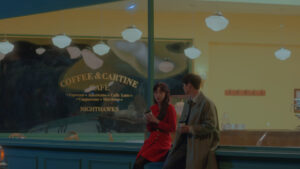
This idea that fate can lead to contrasting possibilities finds resonance in all the “what if”s of the MV. What if Heize had checked the weather forecast and remembered to bring her umbrella in the first place? What if Joong-ki hadn’t forgotten his phone, or realised a moment sooner and hence gotten to the lift in time, like in the second version of events? Or if he had realised he took her coffee before stepping out of the cafe, would they have been able to form a tentative acquaintance when he had to return it to her? There’s a sense of arbitrariness to it all: what makes us turn up (or not) at an exact place and time where someone else happens to be, and what makes it possible or impossible for us to connect with them?
The disappointment that the MV’s final scene seems to bring is balanced by the lyrics, which entertain both possibilities of meeting and non-meeting equally. Even as Heize sings, “More and more our distance grows”, she also says that “We lived on in search of one another”. The repetitive, Run Lola Run-style unfolding of alternate versions of the same events is infused with both wistfulness and hope that, capricious as fate may be, a missed opportunity could also mean you’ll get another chance.
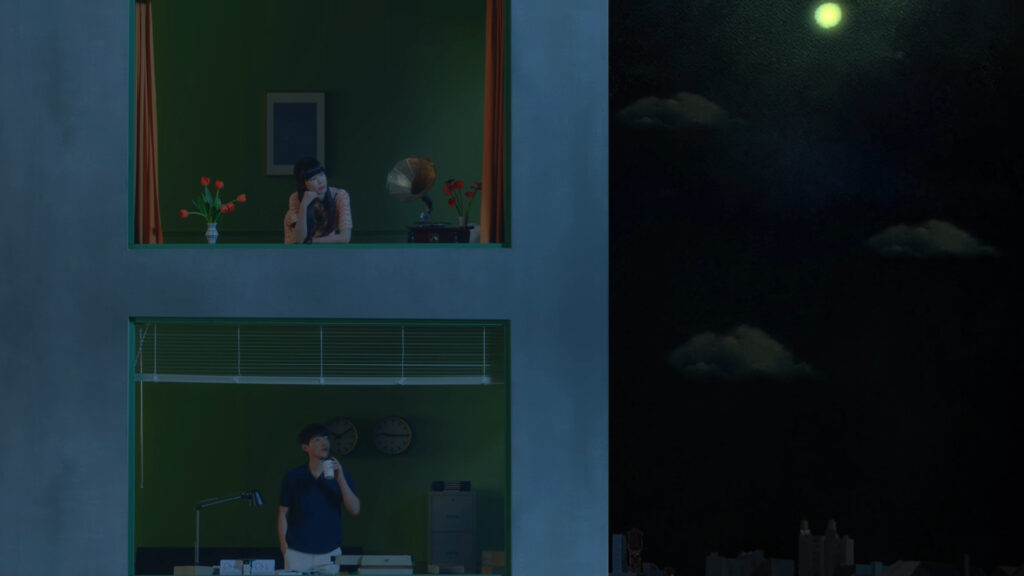
(YouTube. Images via P Nation. Lyrics via YouTube and Bugs.)
